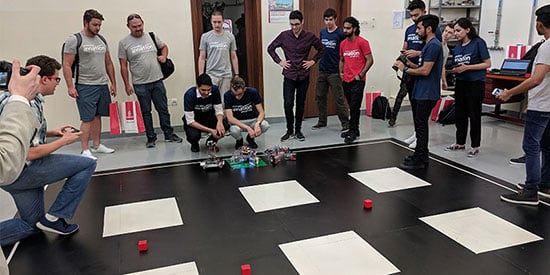Mechatronics challenge takes Deakin engineering students to Dubai
Deakin news
A group of third-year Deakin University mechatronics engineering students were in Dubai in April to team up with students from Emirates Aviation University in Dubai and Coventry University in the United Kingdom for a competition to develop a robotic solution to a simulated agricultural challenge.
Three teams made up of six students from each university participated in the ECD (Emirates, Coventry and Deakin) Smart-Agriculture Robot Competition. Before coming together in Dubai to execute their design, team members initially worked together remotely to plan their solution.
The competition scenario required the students to design the ‘next generation of autonomous farming equipment’. Mr Benjamin Champion, mechatronics teaching scholar in Deakin’s School of Engineering, designed the challenge in conjunction with colleagues from Deakin International.
‘The competitors were required to construct and test one fully autonomous robot per team during the week that they were in Dubai,’ Mr Champion explains.
‘The robots were a very small prototype of robots that might be used in an agricultural setting. The aim was for the teams to design and build a robot that could navigate paddocks, searching for two different problems that might be present in an agricultural environment.
‘One problem simulated something the robot would not be able to fix, requiring it to report the coordinates back to the farmer. The second problem simulated something the robot could fix, such as filling an empty water trough.’
In the competition, 3D printed coloured cubes represented the two problems. Red cubes needed to be reported back to the farmer while blue cubes were problems the robot could solve without assistance. The robot ‘solved’ these problems by collecting the blue cubes and returning them to the starting position, represented by a green square on the playing surface.
White squares were painted on a black surface to represent paddocks. If a robot crossed any of these squares they were disqualified, as this simulated the robot driving into a field and causing damage to the farm.
On the final day of competition, the students gave a presentation of their system to a panel, providing an overview of the mechanical, electrical and software design of the robot, with every team member presenting.
‘The Deakin team members performed extremely well, all standing out in their respective teams,’ Mr Champion says.
Professor Bas Baskaran is Associate Dean (International) in Deakin’s Faculty of Science, Engineering and Built Environment and was involved with setting up the program.
‘Our relationship with Coventry is well established and we were looking for an opportunity to engage students from both institutions for a mobility experience,’ Professor Baskaran explains.
‘Emirates Aviation University (EAU) has a longstanding relationship with Coventry. We suggested to Coventry that it would be great to develop a joint short-term project-based activity based upon Deakin’s Project-Oriented Design Based Learning (PODBL) model.
‘In this inaugural program we had six electronic students from Coventry, six aeronautical and aviation engineering students from EAU and six mechatronics students from Deakin making up the three combined teams.
‘Next year we are looking at expanding this to 10 to 12 students from each institution and completing the project over several months, with the opportunity for EAU students to visit Deakin during Trimester 3.’
Professor Baskaran says while in Dubai the Deakin students also had the opportunity to visit engine testing and maintenance facilities of the Emirates Group.
Share this story

